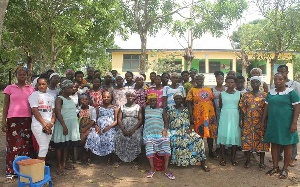The Domestic Services Workers Union (DSWU) of the Trade Union Congress has called on government to pass the Labour (Domestic Workers) Regulations Bill 2016 to accelerate recognition and respect for domestic workers.
The Regulations are aimed at identifying the labour rights of domestic workers; recognise domestic work as a decent and adequately remunerated employment; encourage the formalisation of the employment relationship between a domestic worker and an employer; as well as secure the protection of domestic workers.
It has six sections and 21 subsections covering contract of employment; wages and benefits; maximum hours of work, rest periods, and leave; rights at work; monitoring and compliance; and miscellaneous previsions.
The DSWU also called on the government to ratify the International Labour Organisation (ILO) Convention 189 on Decent Work for Domestic Workers.
The calls were made in a statement read at a news conference by Madam Esther Kosi, the General Secretary of DSWU in Accra on Monday, to celebrate their second anniversary and to press home their demands.
It emphasised that Mr Ken Ofori-Atta, the Minister of Finance had stated in the 2017 budget that the Regulations, initiated last year by the previous government would be passed this year.
The Union was the latest to join the ranks of workers movement in Ghana on September 23, 2015 and its members comprised of people who undertake household cleaning, cooking, washing and ironing of clothes, taking care of children, or elderly or sick members’ family, gardening, house guards, drivers and even caretakers of pets.
The statement said the ILO Convention was adopted in 2011 and stated among others that, member states shall take measures to ensure the effective promotion and protection of the human rights of all domestic workers.
It said the Convention’s recommendation 201 was to provide guidelines for its implementation and defined domestic workers as “any person engaged in domestic work within an employment relationship.”
The statement said many of the workers continue to work under master-slave conditions as they were not conscious of their legal rights as enshrined in the Ghanaian Constitution and its progressive labour laws.
It said the most challenging aspect of the domestic work was the physical and mental abuse, workplace violence and sexual harassment.
It said domestic workers have rights as other workers and thus must be accorded respect and recognition as they contributed enormously to socio-economic value of their employers and the nation as whole.
The DSWU recommended that domestic work must be recognised as paid/salary job and as work open to all regardless of sex, and not the preserve of only women and girls with its attached conditions of work; as well as have social security rights vis-à-vis social protection.
“The rights of domestic workers’ rights must be advanced and implemented in a context and framework of transformative objectives, especially so as the constitution of Ghana guarantees both their human and work rights,” the statement said.
It said the members could not look on for the year to end without the passage of the Regulations, adding that; “we expect government will lay the bill before Parliament during the last sitting before the year ends, to that it can be passed as promised by the Finance Minister, Mr Ken Ofori-Atta during the presentation of the 2017 budget.
“We also recommend that government heed to the call to ratify ILO Convention 189 on Decent Work for Domestic Workers. Passing the Regulation into law and ratifying the ILO C189 will be upholding Article 24(1) of the Fourth Republic Constitution of 1992 which provides the overall framework for conditions of work for workers in Ghana,” the statement said.
Click to view details



General News of Tuesday, 26 September 2017
Source: ghananewsagency.org

















